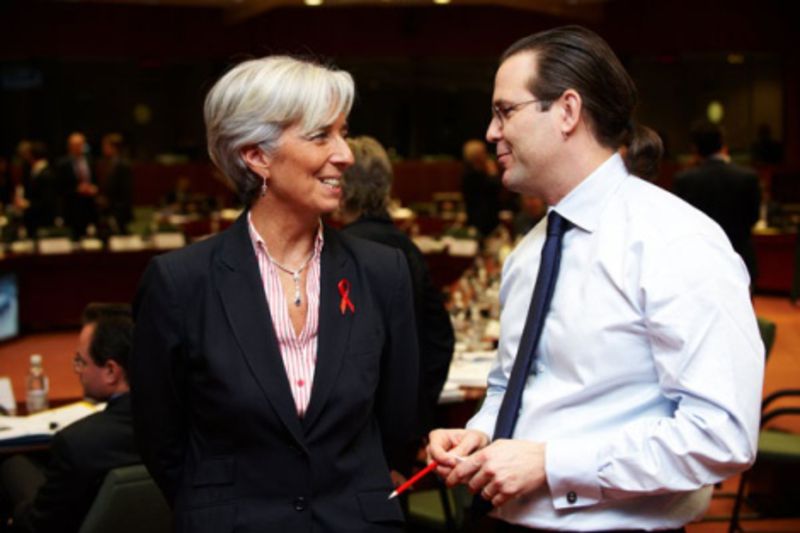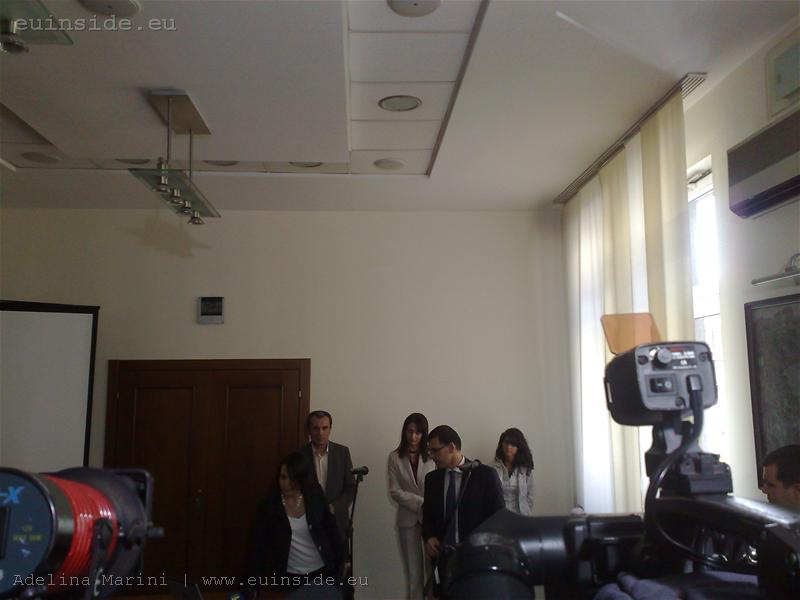Industry Watch: The problem is not with the budget for 2009, but for 2010
Adelina Marini, July 22, 2009
 The review of the budget of Bulgaria for 2009 is actually a preparatory political move for the budget for next year. This is the opinion of the economical analyst Georgi Stoev from the Industry Watch organisation, asked by euinside to comment on the report of the minister of finance Plamen Oresharski about the realisation of the budget for the first half of the year. The advice of Mr. Stoev to the new government is to have political will to cut all unnecessary administrative structures and not to rely too much on the European funds as this money can help but only in some fields and not entirely. Georgi Stoev also explained that the perspective of a minority government should not worry anyone if there is political will for reforms.
The review of the budget of Bulgaria for 2009 is actually a preparatory political move for the budget for next year. This is the opinion of the economical analyst Georgi Stoev from the Industry Watch organisation, asked by euinside to comment on the report of the minister of finance Plamen Oresharski about the realisation of the budget for the first half of the year. The advice of Mr. Stoev to the new government is to have political will to cut all unnecessary administrative structures and not to rely too much on the European funds as this money can help but only in some fields and not entirely. Georgi Stoev also explained that the perspective of a minority government should not worry anyone if there is political will for reforms.
Asked if we could expect any surprises in the end of the year because the tradition for the last several years was the big spendings to be in the second half of the year, Georgi Stove explained: "Yes, because there was a tradition of conservative expenditure policy until the middle of the year or until the Autumn and then, when it was obvious that there will be surplus, it is being spent swiftly. Generally the surplus was being spent with some political goals. Because if this money was not being spent, it would have gone into the fiscal reserve and would have been more difficult for the politicians to access - the issue is simply procedural".
And regarding the review of the budget, the analyst said: "At the moment when this review is decided, almost 3/4 of the year would have passed and contracts for the rest 1/4 would have been concluded. Thus, the talking about a budget review is a formal political move with which the new government wants to show people that next year a lot of expenditures will be cut. I view this more as a first political step toward gaining the support of Parliament for the next budget which should be much more tight than the current one".
But whatever the hardships with the budget might be, this shouldn't be an obstacle for decreasing the social security rates with 5% and even the consideration of some tax cuts. "The fact that incomes are being cut is a sound reason the government to consider whether some taxes are still too high. The reaction of the business toward to global crisis should speak for itself that no matter how low Bulgarian taxes are, some rates continue to be alarmingly high. When we talk about job losses during the first symptoms of the crisis, this means that social security rates which are some 30% of all expenses for labour, are unbearable. So, I think that some tax rates should be cut."
And regarding the fact that the state is holding some 400-500 mn lv (200-250 mn euro) of VAT of the business which has to be returned to the companies, Mr. Stoev explained that this is illegal and the state, as any other object that delays its payments, should be responsible for its actions: "The budget should find ways to tackle with the less revenues by cutting expenditures and not by trying to increase in various illegal ways its revenues, for example by not returning its debts. Everyone that has a credit is supposed to return it and if not - he goes to the court. I don't think that the state should be an exception".
I main leading power of the new government should be optimizing expenses in a way so that all ineffective structures are closed. Asked whether this might cause social tensions, Georgi Stoev said: "The last data for the employment in the budget sector is for about 415,000 people. The biggest number of those employed are in the health care and education, almost half of that number. If we assume that we shouldn't touch anyone in the health care and the education systems, the rest of that number, some 200,000 people could be cut in two. This means that since we have a private sector, agriculture excluded, has some 2.5 mn people hired, another 100,000 shouldn't be a problem".
- And if there is some tension, because you saw what happened during the teachers' strike, the workers of the steal plant "Kremikovtsi", which are definitely less than 100,000 but they managed to attract attention ...
"The workers of "Kremikovtsi" by the end of June were 3,928 people. If we assume that there are many related productions, what the unions will tell you, that if you close the plant the Bulgarian state railway company will suffer, the ports of Burgas and Lom also and another 2-3 firms, if we take the worst scenario, the total number of the workers that will be fired will not exceed 7,500 people. You can see yourself what % of the economy those 7,500 people represent (now some 3.3 mn people are employed in the economy). So you can see that this is a very small % and actually sounds strange that such a small contingent can create any tension or a political crisis".
- It might sound strange but it is a fact that politicians often are tempted to fall into populism even from such small social groups and this might lead to slowing or freezing of reforms.
"Look, the freezing of reforms, ever since the introduction of the currency board has never been caused by social arguments. No matter if we talk about the telecoms by not allowing a second GSM operator as the government of Kostov (1997-2001) did or if you do not privatize various energy companies, but the opposite - you pour more money into an energy forces as the government of Mr. Stanishev did. Usually, the freezing of the reforms is caused by some specific business interests. I find it very hard to give you an example of the opposite when a reform is being blocked by the unions. That is why I think that the populism is mainly in the media. It is clear that there will be talking in the field of populism because this is winning voters. But when actions are needed, a strong will is necessary so that the link to some interests is cut", believes Georgi Stoev.
- However this answer provoked my next question - how possible it is a minority government to realise the necessary reforms?
According to Georgi Stoev, there is no difference if the government is of the minority or a coalition government. "I think that either way the political risk remains, measured in chances for reforms of the business conditions and improvement of the chances for prosperity in Bulgaria. The most fresh example is the last government which was a coalition one, on paper and in the media it was stable but it will remain in history as the weakest and failed governments. So, a coalition does not guarantee the reforms and, like I said, it requires political will and not political juggling with different political groups or leaders. Courage and vision are needed of what should be done. At the moment when you have a sound policy ahead, I'm an optimist that there will be support for it".
 | © Consilium
| © Consilium | © euinside
| © euinside